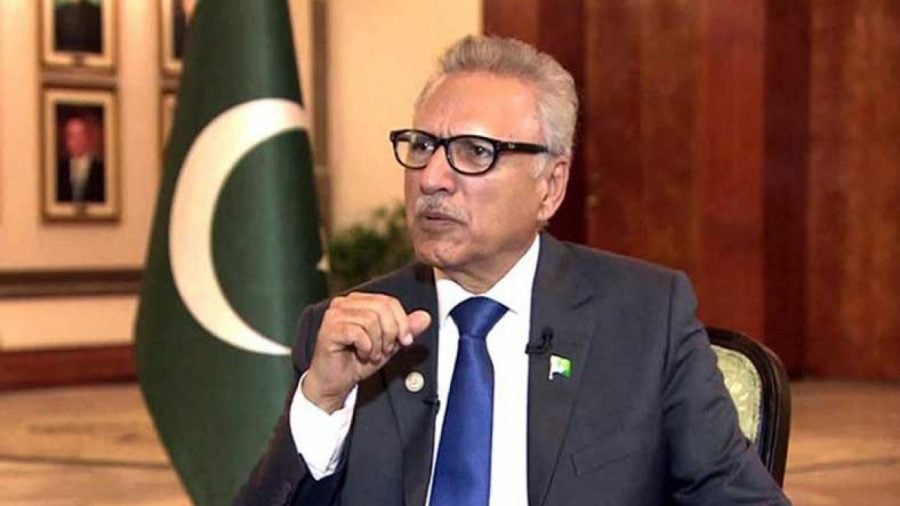President Dr. Arif Alvi praised Pakistan’s military forces and people for courageously battling terrorism, saying that the country sacrificed over 100,000 lives in the battle and emerged triumphant. President Arif Alvi stated today at the major Independence Day celebration at Aiwan-e-Sadr in Islamabad that Pakistan is the only nation in the world that has conquered terrorism.
On this occasion, the president paid glowing homage to Pakistan’s founding leaders, including Quaid-e-Azam Mohammad Ali Jinnah, Allam Iqbal, Syed Ahmad Khan, and others.
Pakistan came into being after immense sacrifices rendered by the Muslims of the sub-continent, he said, adding, “It is due to their sacrifices that we are here today.”
Pakistan has been subjected to three wars under different pretexts, according to the president.
President Alvi talked about India’s nuclear test by saying that Pakistan has worked hard for seven years to provide New Delhi a proper answer. He said that Pakistan was also subjected to an arms race.
Pakistan commemorates its 74th anniversary of independence today (Saturday) with traditional enthusiasm and devotion, with celebratory ceremonies held across the country.
Change of guard rituals was conducted at Mazaar-i-Quaid and Mazaar-i-Iqbal in Karachi and Lahore, respectively, to start the celebrations.
A flag-hoisting ceremony was conducted at Islamabad’s Aiwan-e-Sadr.
President Dr. Arif Alvi, who was the main guest at the ceremony, congratulated the country on its 74th anniversary of independence.
Addressing the ceremony, he said, “today we realize the difficulties that were faced in the course of [Pakistan’s] freedom,” and paid tribute to the leaders of the freedom movement, including Allam Iqbal, Quaid-i-Azam Mohammad Ali Jinnah, and Liaquat Ali Khan.
“It is due to their sacrifices that we are here today,” he said.
The president said that over the past 74 years, “three wars were forced upon us”.
“There is an ongoing race for weapons in the region and Pakistan has been [deliberately] trapped,” he said, adding that despite this challenge, Pakistan, which was essentially an agricultural country, managed to meet its food requirements and was now on the way to becoming an industrial country. He said the country was also making advancements in the area of information technology.
In recounting Pakistan’s achievements in recent years, he said that when India detonated a nuclear explosion in 1974, Pakistan was able to develop a nuclear deterrent in just seven years.
Furthermore, the president said that Pakistan has been combating terrorism since the situation in Afghanistan deteriorated.
“We sacrificed around 100,000 lives and lost around $150 billion, but came out [of that war] victorious.”
He praised Pakistan’s military forces and police for “setting an example” in the battle against terrorism.
The president further stated that “we all are witnesses to [the actions] of nations that claim to be the champions of human rights”.
“Compare them with Pakistan… they let refuge drown in seas and rivers but don’t give them refuge. Pakistan, [on the other hand], gave refuge to 3.5 refugees.”
He added that the nation had stood strong in the face of multiple challenges.
The president also praised the government’s response to the coronavirus pandemic and the establishment of the Ehsaas initiative, urging people to follow Covid-related best practices.
“Our success against the coronavirus is our strength,” he said, adding that while the country battled the pandemic on the principles of welfare, its economy also progressed.
He said that Pakistan has the capacity to grow and urged people to strive toward that goal.
The president also called the world community’s attention to India’s crimes in occupied Kashmir, expressing sympathy with the valley’s people.
“They [the Indian government] is moving towards genocide,” he said, adding that due to the influence of the “Hindutva ideology” in India, peace in the region was not possible.
President Alvi also appealed for peace in Afghanistan, expressing optimism that the country’s peace will be restored.










